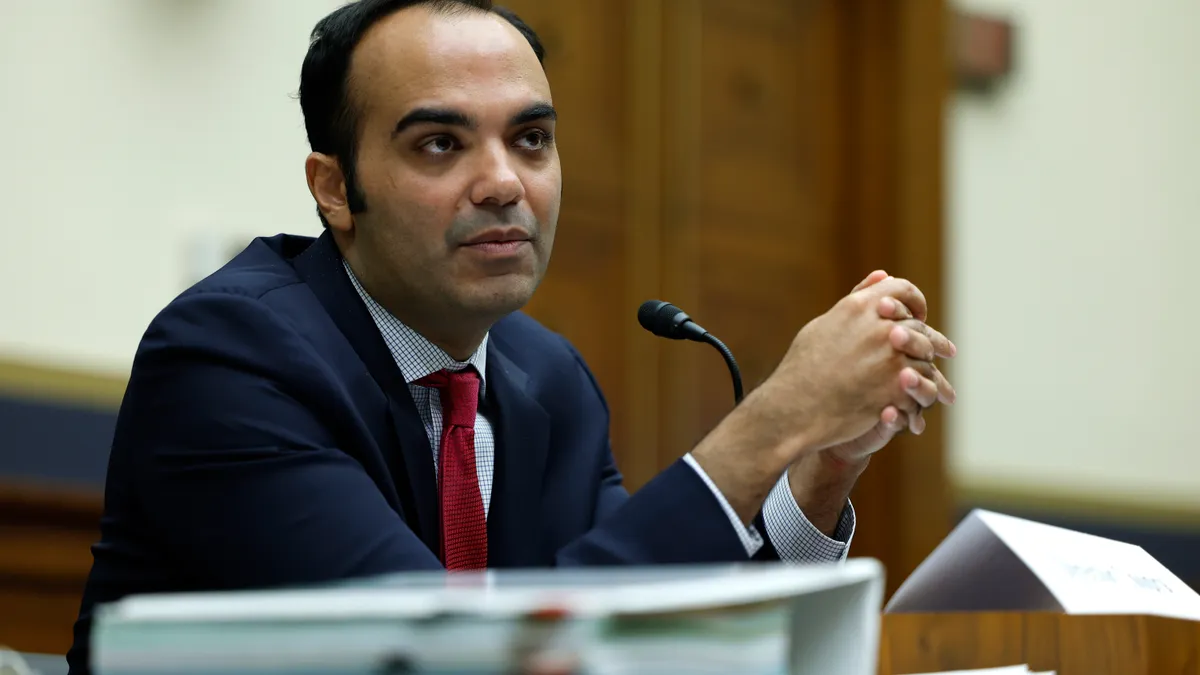For those following the race against the clock to revamp capital requirements, two things rumored to potentially happen this week didn’t.
First, Sept. 19 came and went with no new proposal. Bloomberg’s sources floated that date as the earliest a rewritten proposal could land.
Second, the Federal Deposit Insurance Corp. indeed held a board meeting Tuesday. Reuters had touted it as a chance for the regulator’s five panel members to discuss changes to the multiagency proposal designed to bring U.S. banks in line with the Basel framework.
They discussed fintech-bank relationships at the meeting. Bank merger scrutiny, too. But not Basel.
Now, it sounds as though the proposal has an unanticipated opponent: Consumer Financial Protection Bureau Director Rohit Chopra.
Chopra has privately described the compromise on capital requirements as somewhat of a giveaway to Wall Street banks, Bloomberg reported Friday, citing people familiar with his thinking.
All this time, analysts may have assumed the biggest threat to the reworked Basel proposal came from Republicans who opposed it.
“I’ll be a no,” FDIC board member Jonathan McKernan telegraphed last week after the proposal’s chief author, Federal Reserve Vice Chair for Supervision Michael Barr, previewed some of the changes to the measure. Chief among them: under the latest revision, the U.S.’s biggest banks would be required to hold 9% more capital than they currently do – less than half of the 19% increase the July 2023 first draft proposed.
“We’ve been too focused on reverse engineering a particular capital aggregate — first a significant increase … and now, somewhere in between,” McKernan told Bloomberg.
McKernan last week reiterated his preference for the Basel measure to be withdrawn and re-proposed. The FDIC board’s other Republican, Vice Chair Travis Hill, has long said much the same.
But that leaves three Democrats on the FDIC board, who could overrule the Republicans. A no from Chopra, if true, would flip the dynamic.
It would also run counter to comments Fed Chair Jerome Powell made Wednesday.
“The idea is that we will move as a group to put this again out for comment, and then the comments will come back 60 days later, and we'll dive into bringing this to a conclusion sometime the first half of next year,” Powell said at a press conference to discuss the Fed’s interest rate reduction.
As for when the revamped proposal will land, “we don't have a calendar date for that," Powell said, according to American Banker.
Good thing.
By the calendar, if the revamped proposal were to be released today (and don’t count out a 4 p.m. Friday Fed decree), a 60-day comment period would mean the earliest a rule could be finalized is Nov. 19 — though opponents may argue that new comments would not have been taken into account.
Republican lawmakers who oppose the measure have long said they would seek to rescind it using the Congressional Review Act, under which rules can be halted up to 60 days after they are finalized. That would be Jan. 18 – two days ahead of the inauguration of a new president, but more than two weeks after a new Congress will have come into session. The thinking is, if a majority of House members and senators oppose the rule, the next White House occupant could sign off on it.
At one point, conventional wisdom would have pointed to two party-line monoliths and if Donald Trump were elected, the Basel rule as envisioned would die.
But at least one Democratic senator, Elizabeth Warren of Massachusetts, has come out against the Basel revision, calling it – let’s check against the alleged Chopra wording – “a Wall Street giveaway.”
This may be a sign of confidence in Democratic circles that Vice President Kamala Harris will win. After all, if a key Democrat like Chopra thought a Republican would take the White House, wouldn’t he get behind an effort to get some sort of capital requirements compromise on the books rather than toss it away, saying it doesn’t go far enough?
A representative for Chopra declined to comment to Bloomberg.
The FDIC board’s other two Democrats, Chair Martin Gruenberg and Office of the Comptroller of the Currency acting chief Michael Hsu, both made statements last week emphasizing regulatory cooperation.
“The Federal Reserve, OCC and the FDIC have worked cooperatively on the Basel III proposal, including the changes outlined in Vice Chairman Barr’s remarks,” Gruenberg said Sept. 10. “I look forward to the agencies working together to bring Basel III to a conclusion that will strengthen bank capital and bolster financial system resilience and stability.”
But Bloomberg reported Friday that the Fed’s outsized role in creating 450 pages of revisions to the Basel proposal rewrite left the FDIC and OCC with little voice on the matter.
There’s no saying, though, that the Fed can’t go it alone to hit a January deadline. But past cowboy-like efforts by single regulators who are supposedly in a partnership have often failed in spite of themselves.
Former OCC chief Joseph Otting in 2020 issued a revamp of the Community Reinvestment Act without sign-off from the Fed or FDIC, then promptly resigned. The revamp was criticized as rushed and, after the White House changed hands, Hsu rescinded it.
There’s more to the political picture. Presumably, the FDIC’s vote on the Basel revamp may be the whole reason Gruenberg is still leading that agency. (He agreed to resign this spring in the wake of a damning investigation of the regulator’s culture – as soon as a nominee to lead the FDIC is confirmed.)
If Chopra is a no, is he denying Gruenberg’s legacy one last chance at redemption? Because if the FDIC vote fails, Gruenberg has little reason to stick around than to keep a seat warm.
Then again, if Chopra has proved exceedingly proficient at a specific task in his capacity as an FDIC board member, it’s punctuating the end of the agency chief’s tenure.






















